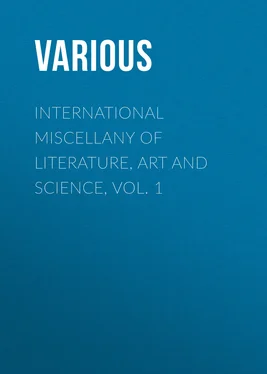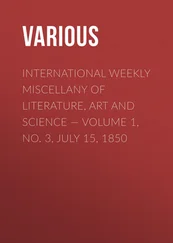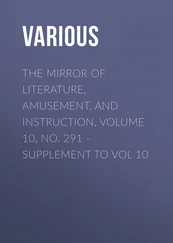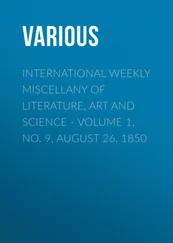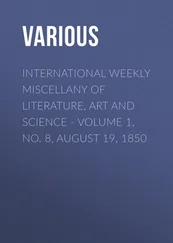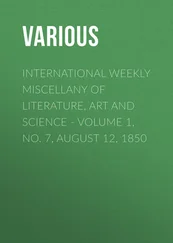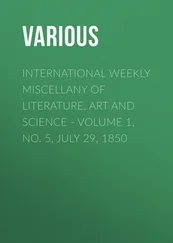Various - International Miscellany of Literature, Art and Science, Vol. 1
Здесь есть возможность читать онлайн «Various - International Miscellany of Literature, Art and Science, Vol. 1» — ознакомительный отрывок электронной книги совершенно бесплатно, а после прочтения отрывка купить полную версию. В некоторых случаях можно слушать аудио, скачать через торрент в формате fb2 и присутствует краткое содержание. Жанр: foreign_antique, periodic, foreign_edu, на английском языке. Описание произведения, (предисловие) а так же отзывы посетителей доступны на портале библиотеки ЛибКат.
- Название:International Miscellany of Literature, Art and Science, Vol. 1
- Автор:
- Жанр:
- Год:неизвестен
- ISBN:нет данных
- Рейтинг книги:3 / 5. Голосов: 1
-
Избранное:Добавить в избранное
- Отзывы:
-
Ваша оценка:
- 60
- 1
- 2
- 3
- 4
- 5
International Miscellany of Literature, Art and Science, Vol. 1: краткое содержание, описание и аннотация
Предлагаем к чтению аннотацию, описание, краткое содержание или предисловие (зависит от того, что написал сам автор книги «International Miscellany of Literature, Art and Science, Vol. 1»). Если вы не нашли необходимую информацию о книге — напишите в комментариях, мы постараемся отыскать её.
International Miscellany of Literature, Art and Science, Vol. 1 — читать онлайн ознакомительный отрывок
Ниже представлен текст книги, разбитый по страницам. Система сохранения места последней прочитанной страницы, позволяет с удобством читать онлайн бесплатно книгу «International Miscellany of Literature, Art and Science, Vol. 1», без необходимости каждый раз заново искать на чём Вы остановились. Поставьте закладку, и сможете в любой момент перейти на страницу, на которой закончили чтение.
Интервал:
Закладка:
It must be said that this Academy is rather a respectable and slow-moving institutution. The most illustrious names of France are not always included in the list of its members. Neither Beranger nor Lamenais belong to it. A writer in the Paris National says that after three hours at its meeting everybody he met in the street seemed to belong to the time of Louis XI.
EDWARD EVERETT has been many years engaged in the collection and arrangement of materials for a systematic Treatise on the Modern Law of Nations; more especially in reference to those questions which nave been discussed between the governments of the United States and Europe since the Peace of 1783. This will be Mr. Everett's "life poem." Hitherto he has written nothing very long except the "Defense of the Christian Religion," published when he was about twenty-one years of age. We have just received from Little & Brown their edition of the "Orations and Speeches" of Mr. Everett, in two very large and richly-printed volumes, which we shall hereafter notice more largely. These are to be followed, at the author's leisure, by his Political Reports and Speeches and Official Papers, in two large volumes, and his contributions to the North American Review , which, if all included, we think will make four others: so that his works, beside the new treatise above mentioned, will be completed in not less than eight volumes. We are gratified at the prospect of such a collection of these masterpieces of rhetoric, so full of learning and wisdom, and infused by so genial a spirit. We wish some publisher would give us in the same style all the writings of Alexander Everett.
CHARLES MACKAY has lately published in London, a work upon which he had long been engaged, under the title of "Progress of the Intellect." We suspect, from the reviewals of it which appear in the journals, that it is of the German free thinking class of philosophical histories. It embraces dissertations on Intellectual Religion, Ancient Cosmogony, the Metaphysical Idea of God, the Moral Notion of God, the Theory of Mediation, Hebrew Theory of Retribution and Immortality, the Messianic Theory prevailing in the days of Jesus, Christian Forms and Reforms, and Speculative Christianity. And these dissertations are written with an eloquence and power unexampled in a work of so much learning.
M. AND MAD. DE LAMARTINE having returned from the East, are at present Staying at the Villa du Prado, a branch of the Hotel des Empereurs, a pleasant house on the banks of the Huveaune, in the midst of the most beautiful landscape. It was in a country box, upon the Avenue du Prado, that Lamartine wrote, in 1847, his "Histoire des Girondins." Lamartine is pleased with his Smyrna estate; he was received there by his vassals en grand seigneur , but he found that he would be obliged to expend a good deal of money before the estate would be profitable.
THEODORE PARKER'S "Massachusetts Quarterly Review," is dead, and—God be Praised that New England refused to support it any longer. Mr. Parker says in the farewell to his readers, that the work "has never become what its projector designed that it should be;" and expresses a hope that "some new journal will presently be started, in a more popular form, which will promote the great ideas of our times, by giving them an expression in literature, and so help them to a permanent organization in the life of mankind."
CAPT. SIR EDWARD BELCHER, R.N., known in the literary and scientific world by his extensive voyages of survey and discovery, is now on a visit to New York, whence he will shortly proceed to Texas. Sir Edward Belcher is a gentleman of remarkable energy of character, and of eminent abilities.
A LETTER from M. Guizot, assigning the motives of his refusal to appear as a candidate of the Institute for a seat in the Superior Council of Public Instruction, is published by the Espérance of Nancy. The Principles avowed by M. Guizot lead directly to a separation of Church and State.
JOHN G. SAXE will soon publish a new poem which he delivered recently at the commencement of Middlebury College, with the applause which crowns all his efforts in this way.
A RE-ISSUE of the Complete Works of Eliza Cook will be shortly commenced in her Journal, and continued weekly until completed.
THE INSTITUTE OF GOETHE has just been founded by the government of Saxe Weimar. It consists simply of a prize of twenty thousand francs offered to the competition of the literary and artistic world. The first year it will be given to the best among the poems, romances, and dramatic works submitted; the second year to the best picture; the third year to the best piece of statuary; the fourth year to the best piece of music, whether sacred or profane, opera or oratorio. This circle having been completed, the prize will next be given as at the first year; and so on in regular succession. The successful competitor is to remain proprietor of his work, as are all the others. The prize will he allotted by two committees, one at Weimar the other at Berlin. The establishment of the fund was celebrated at Weimar on the 23d of August.
GIFFORD, some five-and-twenty years ago, declared that all the fools of the country had taken to write plays; and it would appear that all the dull Englishmen of our day have taken to write pamphlets on the slave-trade. The London Times is very severe upon a book just issued by Mr. W. Gore Ouseley, who was several years British Charge d'Affaires at Rio, as such conducted a voluminous correspondence on the subject with the government of Brazil, and might have been expected to have there learned something on the slave-trade worth telling. According to his reviewer he appears, however, to be one of that class of persons described by Sterne, who, traveling from Dan to Beersheba, found all to be barren; and no amount of observation can in any human being supply defective reasoning faculties. So, says the Times , he has little or nothing to say about the Brazilian slave-trade that has not been better said a thousand times before; and when he does venture on a special statement of his own, it topples down the whole superstructure of his argument.
A work of rather more interest is "Seven Years' Service on the Slave Coast of Africa", by Sir Henry Huntley, who, when a lieutenant in the navy in 1831, was ordered to the scene of his observations. Shortly after his arrival, he was appointed to the independent command of a small vessel, in which he visited stations, looked out for slavers, chased them when he saw them, and captured them when he could. A few years subsequently he was nominated Governor of the settlements on the Gambia. His two volumes contain his adventures during the whole or nearly the whole of his seven years' service upon the station; the last closing abruptly in the middle of preparations for a congress of black kings. The public is already familiar with many of the topics, from the occasional narratives of voyages and adventures along the coast. Visits to the commandants of the so-called castles; a description of the European and native mode of life at the settlements; accounts of the slave-stations, the slave-dealers, the slaves, and the slave-trade, together with sketches of more legitimate commerce, and occasional trips to the islands lying off the coast, for change of air and fresh supplies, are frequent features. Sir Henry Huntley's duties sometimes brought him in contact with native chiefs, and continually with slavers, in the search, the capture, and the pursuit. During the latter part of his career, the office of Governor gave great variety and largeness to his subjects; consisting of public business, palavers with native potentates, and matters connected with home policy. In point of literary character this work very nearly resembles the author's "Peregrine Scramble." Indeed, the "Seven Years' Service" is a sort of continuation of that book, without the form of fiction.
Читать дальшеИнтервал:
Закладка:
Похожие книги на «International Miscellany of Literature, Art and Science, Vol. 1»
Представляем Вашему вниманию похожие книги на «International Miscellany of Literature, Art and Science, Vol. 1» списком для выбора. Мы отобрали схожую по названию и смыслу литературу в надежде предоставить читателям больше вариантов отыскать новые, интересные, ещё непрочитанные произведения.
Обсуждение, отзывы о книге «International Miscellany of Literature, Art and Science, Vol. 1» и просто собственные мнения читателей. Оставьте ваши комментарии, напишите, что Вы думаете о произведении, его смысле или главных героях. Укажите что конкретно понравилось, а что нет, и почему Вы так считаете.
